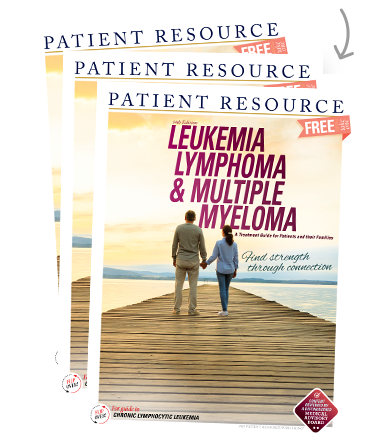Leukemias
Acute Lymphocytic Leukemia
Acute lymphocytic leukemia (ALL) starts in the cells that are destined to become lymphocytes, which are white blood cells that normally help protect people from infections. In ALL, the abnormal cells grow quickly and, if untreated, can spread rapidly from the bone marrow and blood to other parts and be life-threatening. ALL is also called acute lymphoblastic leukemia.
Classifying ALL
Your doctor may use the World Health Organization (WHO) classification system, which considers the results of morph-ology (shape and size of the cancer cells), flow cytometry (the process of identifying markers/proteins on or in a cell), cytogenetic tests (a process that looks at the number and structure of chromosomes that make up the cancer cells), and other molecular lab tests that provide information about genes and, in turn, the subtype of ALL.
Your doctor will also consider the type of lymphocyte (B-cell or T-cell, which are the two main types of lymphocyte) from which the leukemia develops, and how mature the leukemia cells are.
The subtypes of ALL include the following:
- Acute precursor B-cell (pre-B-cell) lymphoblastic leukemia
- Acute T-cell (lymphoblastic) leukemia (T-cell ALL)
- Burkitt acute lymphoblastic leukemia (B-ALL)
In about 4 of every 10 cases of B-cell ALL (B-ALL), an abnormal chromosome, known as the Philadelphia chromosome, is present. It results from an abnormal fusion of the BCR and ABL genes, which produce the BCR-ABL protein. It helps B-ALL cells grow and multiply at a much faster rate than normal white blood cells. Identifying the Philadelphia chromosome, or the BCR-ABL1 gene fusion, is critical as some treatments are more likely to be effective against them.
Treating All
Because ALL progresses quickly, consulting with a leukemia expert physician is recommended right away because treatment should begin soon after diagnosis. The following treatments may be used alone or in combination.
Chemotherapy, given in three phases for approximately three years, is typically the main treatment for ALL. The induction phase is designed to eliminate as many ALL cells as possible. The goal of the consolidation phase is to destroy any remaining leukemia cells. The maintenance phase involves lower-dose treatments to prevent new leukemia cells from growing. Your doctor may prescribe a corticosteroid, which helps destroy the leukemia cells and reduces inflammation.
Targeted therapy is drug therapy that works against specific abnormal proteins inside the leukemia cells and includes tyrosine kinase inhibitors (TKIs). TKIs are used primarily to treat ALL that is Philadelphia chromosome-positive. Resistance to targeted therapy is common in B-ALL, but more targeted therapies are being developed to target the BCR-ABL gene fusion in B-ALL.
Immunotherapy is approved in these forms:
- Chimeric antigen receptor (CAR) T-cell therapy for children and young adults with B-ALL. Though serious side effects can occur from CAR T-cell therapy, it can induce a complete remission when other treatments have failed.
- Monoclonal antibodies (mAbs), which are artificial antibodies (proteins) designed to attack specific targets such as proteins found on cancer cells.
Stem cell transplantation in the form of an allogeneic transplant may be an option to treat poor-prognosis, relapsed or refractory ALL.
Radiation therapy may be used to treat leukemia cells that have metastasized (spread) to other areas of the body, such as the fluid surrounding the brain and spine or to the testicles. When given to the brain or spinal cord, it is known as central nervous system (CNS) sanctuary therapy or CNS prophylaxis. The goal is to help reach leukemia cells that may be hiding in areas that are typically hard for chemotherapy to reach.
Refractory or Recurrent ALL
Treatment may not always result in complete remission. This is known as refractory ALL. If it returns after going into remission, it is considered recurrent or relapsed. Your doctor will re-evaluate your diagnosis and may choose a different therapy including a clinical trial.
|
Drug therapies for ALL
These therapies may be used alone or in combination. |
| asparaginase (Elspar) |
| asparaginase erwinia chrysanthemi (recombinant)-rywn (Rylaze) |
| blinatumomab (Blincyto) |
| brexucabtagene autoleucel (Tecartus) |
| calaspargase pegol – mknl (Asparlas) |
| clofarabine (Clolar) |
| cyclosphosphamide |
| cytarabine |
| dasatinib (Sprycel) |
| daunorubicin |
| dexamethasone |
| doxorubicin hydrochloride (Adriamycin) |
| imatinib mesylate (Gleevec) |
| inotuzumab ozogamicin (Besponsa) |
| mercaptopurine (Purinethol, Purixan) |
| methotrexate |
| nelarabine (Arranon) |
| pegaspargase (Oncaspar) |
| ponatinib (Iclusig) |
| prednisone |
| tisagenlecleucel (Kymriah) |
| vincristine (Oncovin) |



